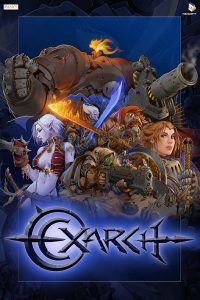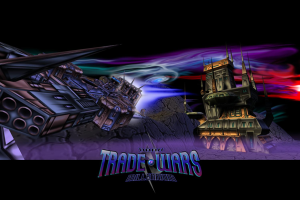Exarch, also known as Exarch Online, is a cancelled futuristic fantasy Massively Multiplayer Online Role-Playing Game published by NCSoft and developed by Realm Interactive around 2002-2004, exclusively for the PC.
The game took place in the far future where the galaxy is in turmoil after the collapse of the Great Empire. The player must choose a side whether it’s helping the governors, called Exarch, rebuild civilization, or choosing another faction seeking anarchy and chaos.
It was build and partially based on another cancelled game which was Trade Wars: Dark Millenium.
Exarch was officially revealed in March 2003 by IGN, after the cancellation of previous Realm Interactive’s project, Trade Wars: Dark Millenium, in which several design ideas were going to be placed back:
Trade Wars: Dark Millennium, from Realm Interactive by way of NCsoft, once promised to transport players to an online world where science and fantasy meet. But although the title still promises to deliver a healthy mix of lasers and longswords, it will do so under a different name. Now known as Exarch Online, the game will still feature androids and dragons, as well as the titular Exarchs themselves. The game will feature the work of comic artist Joe Madureira, creator of Battle Chasers and former artist for The Uncanny X-Men.
Exarch, a massively multiplayer online RPG based on the classic BBS game Trade Wars 2002, is currently in development by Realm Interactive. The game will be set in a universe that blends mystical, futuristic, and medieval elements together to create a unique aesthetic. Realm Interactive has enlisted the help of comic book artist Joe Madureira, whose past experience includes Uncanny X-Men, Battle Chasers, Excalibur, and Deadpool Limited, to conceive the look of the characters, creatures, and environments that will make up Exarch, in hopes of giving the game a distinct, well-defined sense of style.The game will take place far in the future, shortly after the collapse of the Great Empire, which had up until then benevolently ruled the known galaxy for nine millennia. Now, the galaxy is in turmoil as the remaining governors, known as Exarchs, scramble to salvage what is left. You’ll have to choose sides and either help the remaining governors rebuild the empire, or go the other way and help bring total chaos and anarchy to the galaxy. The developer claims that the different factions will play a big part in shaping the different social classes in the world of Exarch.The gameplay will be more akin to action RPGs like Blizzard’s Diablo series than your standard MMORPG. You’ll be fighting large swarms of monsters at a time, such as mutants, robots, dragons, and the undead, using a streamlined battle system to keep the pacing of the game at a good clip. There will be four different playable races and twelve different character classes for you to choose from and you’ll have ranged weapons, melee weapons, and magic attacks at your disposal to fend off enemies with.
The game sets itself apart with fast-paced combat mechanics that give it a very Dungeon Siege-like feel. Like in a standard action RPG, you move your character around using the mouse and simply click on enemies to attack them, making Exarch very easy to pick up. The game’s 3D graphics feature impressive detail in the character models and environments. Currently, the developers at Realm Interactive plan on including four races in the game: wraiths, humans, gnomes, and golems. Each of the races will have three unique classes, but details are sketchy on the classes at this time. Exarch mixes fantasy elements with technology and sci-fi, so expect a nice mix of medieval-style weapons like swords and axes along with firearms, cyber implants, and powered armor. The character demonstrated to us was a male wraith, with both a sword and a shotgun (which was used to nice effect against the mechanical skeletons in the caverns–each blast knocked the skeletons to the ground in a satisfying manner). The developers will encourage grouping by allowing each player in the game to have an aura effect. These can either bestow benefits on the party or inflict penalties on nearby enemies. Obviously, larger groups can enjoy the benefits of multiple overlapping auras.The game’s questing system also sets it apart from other massively multiplayer games. All the quests are instanced, but instead of having strictly scripted missions, the developers are allowing for a number of different options to play out in each quest. For example, you and a friend could play the same quest–an old man asking you for help rescuing his daughter from a dungeon–separately. Your quest might play out in standard fashion, with you working your way through a cave and rescuing the girl. In your friend’s version, the girl might end up transforming into a Succubus, forcing him to kill her at the end of the quest. In yet another version, the cave entrance could collapse, necessitating that you find an alternate exit from the dungeon. Or any number of different permutations of the mission’s optional parameters could occur, further adding to the variety.The game is still early in development, but the developers of Exarch are aiming to create a game that will be among the easiest massively multiplayer role-playing games to pick up. Its mix of fantasy and technology should also help set it apart from a genre that is getting more crowded by the day.
Exarch is a massive online game that eerily resembles a popular single player game that has a multi-player component – Diablo II. It is a fast paced action role playing game where players will enter this beautiful fantasy world rich with lore and battle their way through hundreds of enemies and take on numerous tasks. There are no tradeskills, as this is a very combat oriented game.
When I first sat down to view this game, my initial impression was that this was a fantasy game with typical fantasy elements, that being swords, staff, old fashioned armor and the traditional monsters. I did a double take, though, when I noticed one of the characters pulling out a gun and shooting an monsters head off. Guns, I asked? That is when I discovered that while this area they were showing me had a distinctly fantasy feel to it, the game as a whole has a futuristic setting.
During the demonstration, one level 5 character took on about 15 monsters at a time and was one hitting them all over the place. We were told this won’t be typical, but it will happen. The combat was very fast paced to watch and it seemed like the character was always moving, with very little down-time.
Exarch is scheduled for release in 2004, so look for a beta around then as well.
After E3, the title, however, faded into total obscurity and was only mentionned when its cancellation was confirmed on Blue’s News, in July 2004, more than year after its last and only presentation:
Word from NCsoft is that Exarch, the MMORPG previously known as Trade Wars: Dark Millennium, is “on hold.” Noticing that www.exarchonline.com and www.realminteractive.com are both out of commission, Frans wrote to NCsoft’s David Swofford asking about the game’s status, receiving the following reply: “The current situation with Exarch is this. The Exarch project is currently on hold here at NCsoft. At the present time, NCsoft is still determining how, when and if Exarch or any of its technology will be utilized in the future. For now the Exarch team, that was based in Phoenix, AZ under the company banner of Realm Interactive, has relocated to Austin, TX and is working on other projects at the NCsoft office.”
In 2005, NCSoft announced Dungeon Runners, another MMORPG which used some concepts and gameplay originally intended for Exarch, but without the futuristic setting. It was released in May 2007, but shutted down on January 1st, 2010, less than three years after its release. Joe Madureira left NCSoft, somewhere in 2005, during the transition between the cancellation of Exarch and the beginning of Dungeon Runner’s development. Some of his work for Exarch was retained for Dungeon Runners, alongside brief work on Tabula Rasa, although no credits is given by NCSoft.


